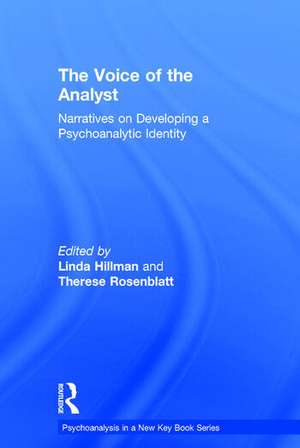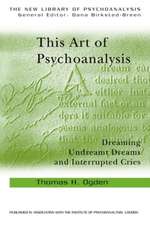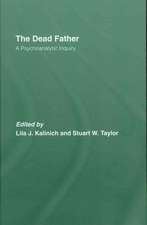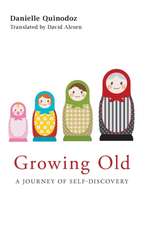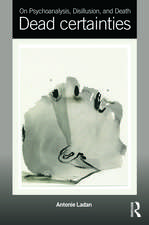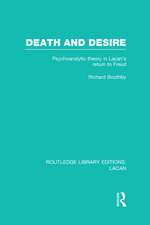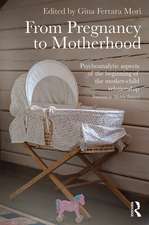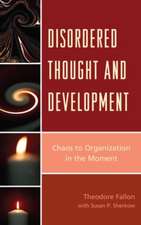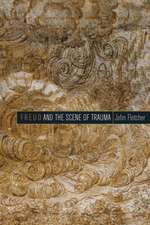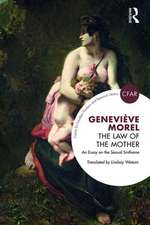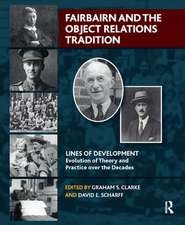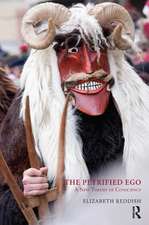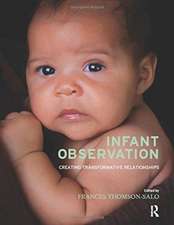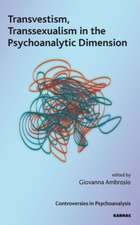The Voice of the Analyst: Narratives on Developing a Psychoanalytic Identity: Psychoanalysis in a New Key Book Series
Editat de Linda Hillman, Therese Rosenblatten Limba Engleză Hardback – 22 aug 2017
The Voice of the Analyst contains personal narratives by twelve psychoanalysts, each taking the reader through his or her unique path toward developing a voice and identity as an analyst. All come from different backgrounds, theoretical orientations and stages of their careers. The narratives are courageous and uncommonly revealing in a profession that demands so much reserve and anonymity from its practitioners. This book demonstrates that the analyst's work is a product of their characters as well as training and theory.
The narrative form in this book offers a refreshing and necessary companion to the theoretical and clinical writing that dominates the field. The editors show the importance of developing a unique voice and identity if one is to function well as an analyst. This endeavor cannot be accomplished solely through technical training, especially with the isolation that characterizes clinical practice. There are pressures that analysts experience alone in their practice, from patients and themselves as well as other professionals, forces that render technical training and theory alone inadequate in facilitating the development of one's analytic voice and identity. Enter the form of the personal narrative presented in this book.
This fascinating compilation of narratives shows how the contributors bear striking similarities and differences to one another. Despite their different backgrounds, they display commonality in their sensitivity towards mental and emotional states and their wish to heal suffering. However, they also exemplify wide differences in motivations, interests and what makes them tick as psychoanalysts. The Voice of the Analyst will be a great companion book for established psychoanalysts and psychoanalytic psychotherapists and those in training, as well as mental health professionals keen to understand what it takes to become a psychoanalyst and to enhance their personal and professional development.
| Toate formatele și edițiile | Preț | Express |
|---|---|---|
| Paperback (1) | 377.98 lei 6-8 săpt. | |
| Taylor & Francis – 22 aug 2017 | 377.98 lei 6-8 săpt. | |
| Hardback (1) | 936.92 lei 6-8 săpt. | |
| Taylor & Francis – 22 aug 2017 | 936.92 lei 6-8 săpt. |
Din seria Psychoanalysis in a New Key Book Series
- 5%
 Preț: 191.35 lei
Preț: 191.35 lei - 5%
 Preț: 219.54 lei
Preț: 219.54 lei - 5%
 Preț: 234.07 lei
Preț: 234.07 lei - 5%
 Preț: 226.26 lei
Preț: 226.26 lei -
 Preț: 275.46 lei
Preț: 275.46 lei - 5%
 Preț: 259.92 lei
Preț: 259.92 lei - 5%
 Preț: 296.12 lei
Preț: 296.12 lei -
 Preț: 244.88 lei
Preț: 244.88 lei - 5%
 Preț: 195.29 lei
Preț: 195.29 lei -
 Preț: 244.56 lei
Preț: 244.56 lei - 5%
 Preț: 379.45 lei
Preț: 379.45 lei - 5%
 Preț: 230.76 lei
Preț: 230.76 lei -
 Preț: 245.28 lei
Preț: 245.28 lei - 5%
 Preț: 253.66 lei
Preț: 253.66 lei - 5%
 Preț: 219.91 lei
Preț: 219.91 lei -
 Preț: 191.17 lei
Preț: 191.17 lei -
 Preț: 243.93 lei
Preț: 243.93 lei - 5%
 Preț: 233.47 lei
Preț: 233.47 lei - 5%
 Preț: 274.66 lei
Preț: 274.66 lei - 5%
 Preț: 331.07 lei
Preț: 331.07 lei - 5%
 Preț: 233.18 lei
Preț: 233.18 lei - 5%
 Preț: 162.03 lei
Preț: 162.03 lei - 5%
 Preț: 231.45 lei
Preț: 231.45 lei - 5%
 Preț: 259.92 lei
Preț: 259.92 lei - 5%
 Preț: 273.59 lei
Preț: 273.59 lei - 5%
 Preț: 233.69 lei
Preț: 233.69 lei - 5%
 Preț: 1013.91 lei
Preț: 1013.91 lei - 5%
 Preț: 243.98 lei
Preț: 243.98 lei - 5%
 Preț: 278.54 lei
Preț: 278.54 lei - 5%
 Preț: 317.21 lei
Preț: 317.21 lei - 12%
 Preț: 330.99 lei
Preț: 330.99 lei - 12%
 Preț: 938.70 lei
Preț: 938.70 lei - 5%
 Preț: 457.36 lei
Preț: 457.36 lei -
 Preț: 477.40 lei
Preț: 477.40 lei - 17%
 Preț: 238.23 lei
Preț: 238.23 lei -
 Preț: 379.75 lei
Preț: 379.75 lei - 5%
 Preț: 413.98 lei
Preț: 413.98 lei - 11%
 Preț: 275.64 lei
Preț: 275.64 lei - 5%
 Preț: 379.60 lei
Preț: 379.60 lei -
 Preț: 399.79 lei
Preț: 399.79 lei - 5%
 Preț: 1413.95 lei
Preț: 1413.95 lei -
 Preț: 385.88 lei
Preț: 385.88 lei - 5%
 Preț: 362.63 lei
Preț: 362.63 lei
Preț: 936.92 lei
Preț vechi: 1065.36 lei
-12% Nou
179.29€ • 191.71$ • 149.48£
Carte tipărită la comandă
Livrare economică 17 aprilie-01 mai
Specificații
ISBN-10: 1138929131
Pagini: 234
Dimensiuni: 156 x 234 mm
Greutate: 0.48 kg
Ediția:1
Editura: Taylor & Francis
Colecția Routledge
Seria Psychoanalysis in a New Key Book Series
Locul publicării:Oxford, United Kingdom
Public țintă
Postgraduate, Professional, and Professional Practice & DevelopmentCuprins
Notă biografică
Therese Rosenblatt, PhD, is a psychologist and psychoanalyst in private practice in New York City and Westchester County, New York. She treats adults, children, adolescents, couples and families. She leads parenting groups privately and at the Early Childhood Development Center in New York City. She is on the faculty of the Metropolitan Institute for Training in Psychoanalytic Psychotherapy. She is Adjunct Clinical Supervisor at Yeshiva University and Pace University in New York and an active member of the New York University Postdoctoral Program in Psychoanalysis and Psychotherapy.
Recenzii
"This is a wonderful book! It is a treasure trove of deeply considered personal narratives, replete with insight, humanity, and modesty. The reader is transported from culture to culture, through different historical periods, fields of inquiry, and into varied economic circumstances through the stories of these twelve psychoanalysts of different ages, nationalities, and theoretical perspectives. Whether it is through the playing of a sport, or the writing of a poem or essay, or a transformational moment in a personal clinical treatment, these authors tell us how they became the psychoanalysts they are – excellently edited and integrated by Drs Hillman and Rosenblatt. It was a treat to read."-Marsha H. Levy-Warren, Ph.D., Faculty and Clinical Consultant, NYU Postdoctoral Program in Psychotherapy and Psychoanalysis
Descriere
The Voice of the Analyst contains personal narratives by twelve psychoanalysts, each taking the reader through his or her unique path toward developing a voice and identity as an analyst. All come from different backgrounds, theoretical orientations and stages of their careers. The narratives are courageous and uncommonly revealing in a profession that demands so much reserve and anonymity from its practitioners. This book demonstrates that the analyst's work is a product of their characters as well as training and theory.
The narrative form in this book offers a refreshing and necessary companion to the theoretical and clinical writing that dominates the field. The editors show the importance of developing a unique voice and identity if one is to function well as an analyst. This endeavor cannot be accomplished solely through technical training, especially with the isolation that characterizes clinical practice. There are pressures that analysts experience alone in their practice, from patients and themselves as well as other professionals, forces that render technical training and theory alone inadequate in facilitating the development of one's analytic voice and identity. Enter the form of the personal narrative presented in this book.
This fascinating compilation of narratives shows how the contributors bear striking similarities and differences to one another. Despite their different backgrounds, they display commonality in their sensitivity towards mental and emotional states and their wish to heal suffering. However, they also exemplify wide differences in motivations, interests and what makes them tick as psychoanalysts. The Voice of the Analyst will be a great companion book for established psychoanalysts and psychoanalytic psychotherapists and those in training, as well as mental health professionals keen to understand what it takes to become a psychoanalyst and to enhance their personal and professional development.
